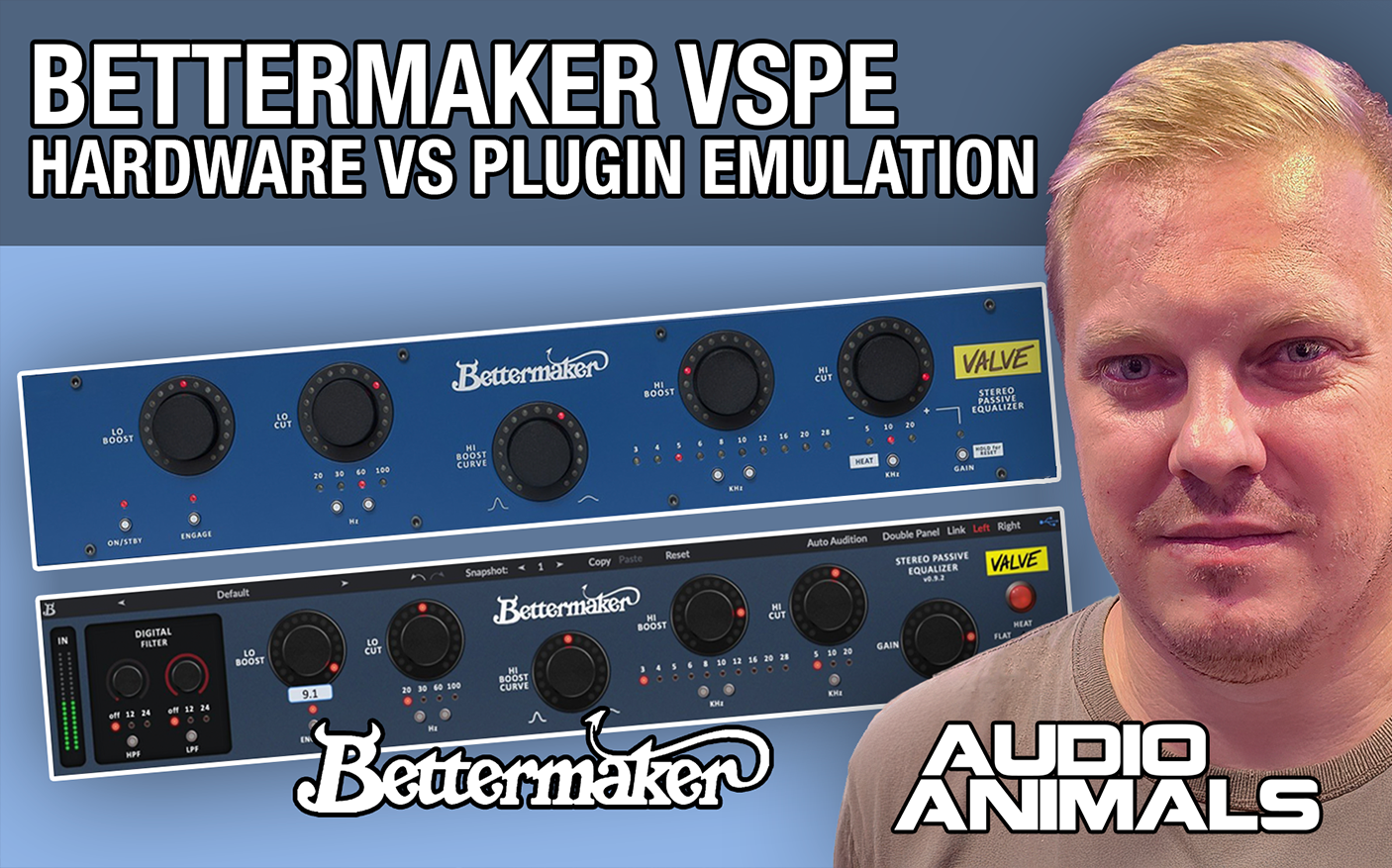In this video I directly compare the Bettermaker VSPE hardware to the plugin emulation. This is a prime of example of how no matter what people say plugin emulations are not a 1 for 1 emulation of the hardware. The difference is night and day and that can clearly been heard in these audio examples.


HARDWARE VS PLUGIN EMULATION
- Original – Playback of hardware processing
- Plugin – Playback of plugin emulation
Hardware VS Plugin Emulation – Full Song 1
Hardware VS Plugin Emulation – Full Song 2
Hardware VS Plugin Emulation – Drums
Hardware VS Plugin Emulation – Bass
ABOUT BETTERMAKER VSPE
Bettermaker Valve Stereo Passive Equalizer (VSPE) is a breakthrough in audio engineering, combining the timeless warmth of vacuum tube technology with the precision of digital recall. Years of meticulous development and testing have culminated in a product that promises to revolutionize your sound.
VALVE STEREO PASSIVE EQUALIZER
Drawing on Bettermaker`s expertise in Grammy award-winning studio processors, They have crafted a fully analog passive equalizer featuring original vacuum tube and transformer circuitry. But they didn`t stop there. They`ve integrated their own handcrafted audio transformers from Bettermaker, ensuring unparalleled quality and performance.
Passive equalizers are renowned for their ability to impart a round, warm bottom end and an airy high-frequency range. Now, imagine enhancing that richness with the unmistakable character of vacuum tubes and transformers. That`s the essence of HEAT, Bettermaker`s signature sound.
With Bettermaker`s innovative design, you can effortlessly balance between pristine vacuum tube transparency and the lush saturation of tubes and transformers with the press of a button. And thanks to seamless integration with their plug-in and DAW, you can recall and automate settings with ease.
DAW PLUG-IN
Speaking of plug-ins, their new VSPE plug-in takes versatility to new heights. Not only can you recall and automate all parameters within your DAW, but you can also audition high and low frequencies independently. Plus, with stereo and dual-mono modes at your fingertips, the possibilities are endless.
Bettermaker`s plug-in features a mastering-grade digital high-pass and low pass filters, perfect for sculpting your low and high end with precision.
Whether you`re recording, tracking, producing, mixing, or mastering, the VSPE offers unparalleled flexibility and sonic character in a single, elegant package. Experience the best of both worlds with the VSPE: where vintage warmth meets cutting-edge technology.
TUBES
The tubes used in their devices were produced in the USSR in the 70s and 80s exclusively for the needs of the military and were intended for use in the electronics of ballistic missiles and military jet fighters. Meeting very strict requirements in terms of durability and electrical parameters, they have been designed in such a way as to minimize the phenomenon of microphonics and ensure very high parameters even after a long period of use. This is one of the few Tubes in which attention was paid to the extremely low level of noise and distortion. Each tube that left the factory then, was selected during strict tests of all parameters and has an individual military acceptance stamp.
The tube type is a double triode with a screen between the two triodes. Maximum convergence of the parameters of two triodes plus extremely low capacitance between them below 0.1pf. Precious metal alloys and special gases used to eliminate lamp vibration noise. The decision to create their own transformers wasn`t born out of a lack of options in the market. There`s no shortage of professional-grade products available, with many claiming to offer top-tier performance. However, upon comparing them to classic, renowned transformers, the disparity becomes evident.
TRANSFORMERS
Having worked extensively with over a hundred different vintage transformers from esteemed manufacturers like Siemens (for WSW, Telefunken, military), Collins, Marinair, UTC, Malotki, Soviet military, and others, the differences are not just audible but measurable. One of the most glaring issues arises in the lower frequency range, where distortion levels can be significantly higher than at 1kHz. While frequency response might appear adequate, the coherence of the sound in the lower range often falls short of musical expectations. To cut a long story short, after years of rigorous research and collaboration with core manufacturers, They have finally developed a transformer that satisfies us on multiple fronts—as musicians, a sound engineers, and an electronics developers.
DAW INTEGRATION
Bettermaker Valve Stereo Passive Equalizer is delivered with hybrid DAW plug-in that allows you to control and recall all settings of the hardware. Additionally provides high quality digital HPF and LPF, spectrum analyzer, session snapshots and other useful functions such as dual mono operation, audio level metering and quantize (step) mode for all hardware knobs. You can also adjust VSPE filters by dragging handles on the EQ curve graph. Currently selected band will be solo’ed to let you hear the changes.
Please note that some hardware features are available only when DAW plug-in is connected and active. In standalone mode VSPE will link both channels and disable quantize mode. HEAT function is always linked, regardless the link mode or channel selected
FEATURES
• Intuitive DAW plug-in including mastering FPF, LPF and band Audition engine
• Vacuum tube drive stage featuring NOS military spec tubes
• In-house handcrafted Bettermaker TT-1 audio transformers
• FET-input Burr-Brown op amps and hand matched inductors
• GAIN Mode allows output level adjustment and HEAT function which drives the tubes harder adding saturation and color
• VSPE DAW control plug-in allows setting recall and automation via USB connection (AU/VST3/AAX)
• Additional features available via DAW plug-in
• Heat audio circuitry provides warmth and rich harmonics
• Nominal audio level: +4 dBuMax LF boost: 15 dB (set to 100 Hz)
• Max LF cut: 16 dB (set to 100 Hz)
• Max HF boost: 18 dB (all frequencies)
• Low boost/cut frequencies: 20, 30, 60, 100 Hz
• High boost frequencies: 3, 4, 5, 6, 8, 10, 12, 16, 20, 28 kHz
• High cut frequencies: 5, 10, 20 kHz
• Designed, developed, and built in Poland

